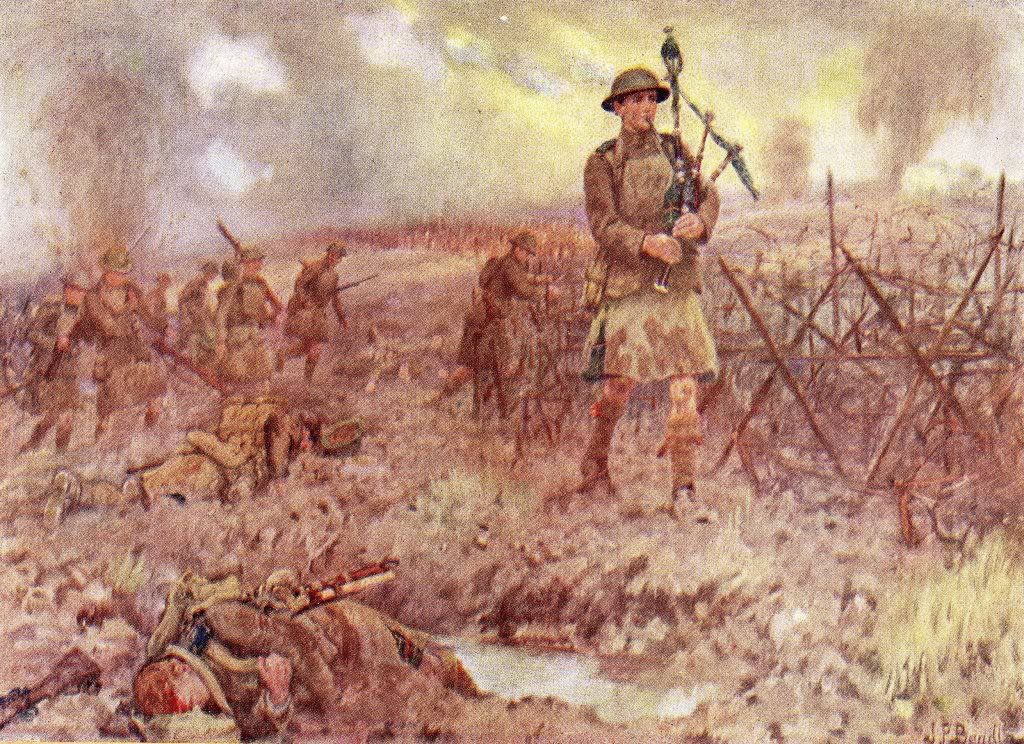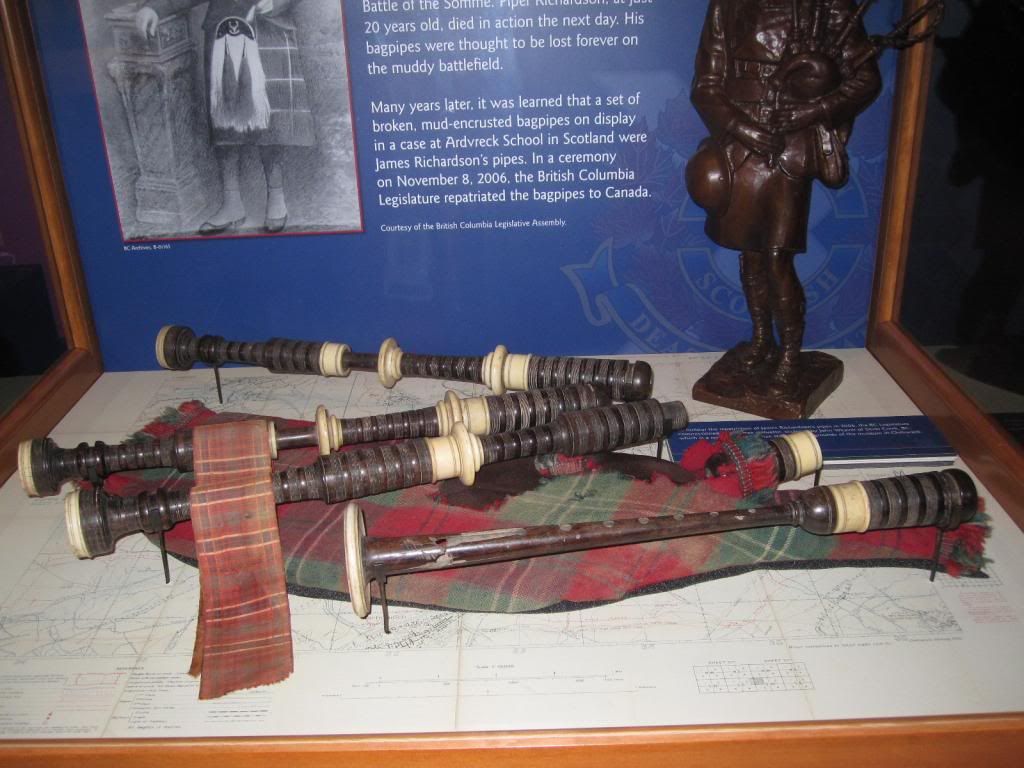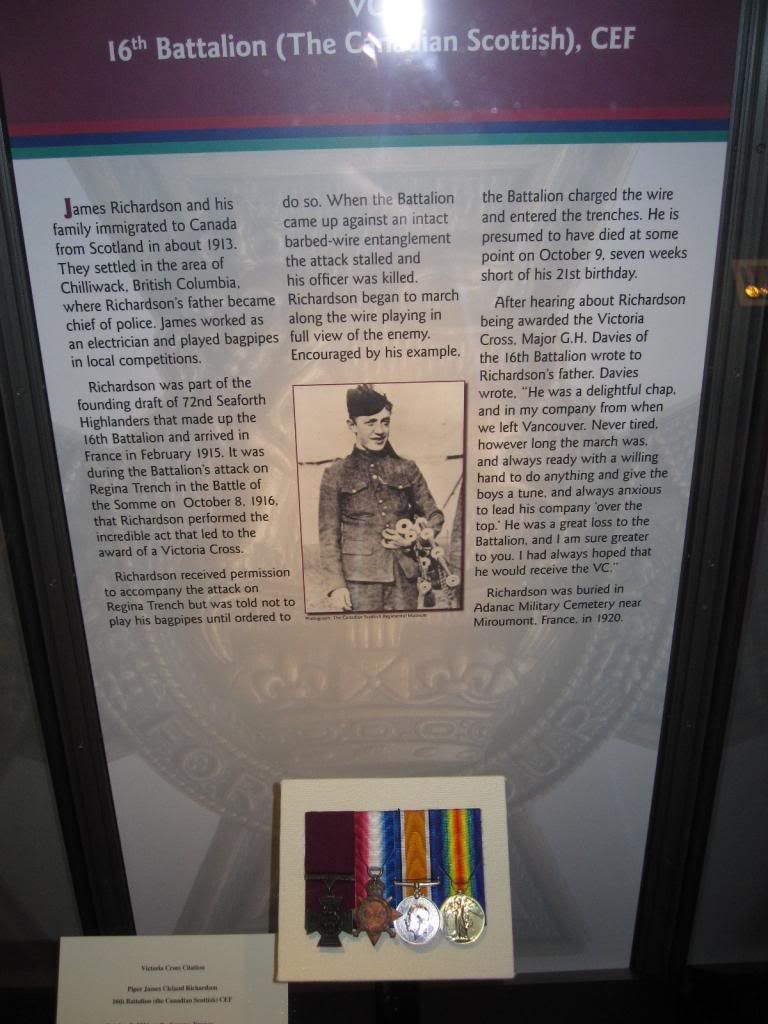|
-
10th November 12, 02:51 PM
#1
WW1 Piper in kilt on battlefield
Was browsing Britishpathe.com and found this interesting photo of a kilted piper on the battlefield. Ive included the text with the photo and a link to the page with the other 10 photos. This is the only one of a kilted piper, the rest are of the men in the trenches.

Included text with the photo.
"The Pipers
Over a 1000 pipers died during WWI. These extraordinary men were sitting ducks as they went over the top to pipe their men into battle. Piper Harry Lunan was the last surviving piper and he said,
"I just played whatever came in to my head, but I was worried about tripping on the uneven ground, which interrupted my playing. The enemy fire was murderous, the men were falling all around me. I was lucky to survive. Hearing the pipes gave the troops courage." "
Link to the rest of the photos on Britishpathehttp://www.britishpathe.com/gallery/ww1-telling-images/
"Greater understanding properly leads to an increasing sense of responsibility, and not to arrogance."
-
-
10th November 12, 03:04 PM
#2
A great photo and what brave men. Thanks for posting it.
The Kilt is my delight !
-
-
10th November 12, 03:06 PM
#3
amazing , makes me think of the tune green hills of tyrol
-
-
10th November 12, 05:12 PM
#4
I am Matty Ross of the Clan ROSS
-
-
10th November 12, 07:52 PM
#5
Those guys had serious balls. Such valour!
The Official [BREN]
-
-
10th November 12, 09:09 PM
#6
James Richardson VC. Regina Trench, Vimy Ridge, 1915

-
-
10th November 12, 11:33 PM
#7
For this entire month the Royal BC Museum is hosting a tribute to the Canadian Scottish Regt. who are celebrating their 100th anniversary. One part of the exhibit is this case.

The story goes that after the attack he was helping carry wounded from the field when he remembered he had forgotten his pipes.
He returned to retrieve them and was never seen again.


The Text:
James Richardson and his family immigrated to Canada from Scotland in about 1913. They settled in the area of Chilliwack, British Columbia, where Richardsons' father became Chief of Police. James worked as an electrician and played bagpipes in local competitions.
Richardson was part of the founding draft of the 74th Seaforth Highlanders that make up the 16th Battalion and arrived in France in February 1915. It was during the Battalion's attack on Regina Trench in the Battle of the Somme on October 8, 1916 that Richardson performed the incredible act that led to the award of a Victoria Cross.
Richardson received permission to accompany the attack on Regina Trench but was told not to play his bagpi9pes until ordered to do so. When the Battalion came up against an intact barbwire entanglement the attack stalled and his officer was killed. Richardson began to march along the wire playing in full view of the enemy. Encouraged by his example the Battalion charged the wire and entered the trenches. His is presumed to have died at some point on October 9, seven weeks short of his 21st birthday.
After hearing about Richardson being awarded the Victoria Cross Major G.H. Davies of the 16th Battalion wrote to Richardson's father "He was a delightful chap, and in my company from when we left Vancouver. Never tired, however long the march was, and always ready with a willing hand to do anything and give the boys a tune, and always anxious to lead his company 'over the top'. He was a great loss to the Battalion, and I am sure greater to you. I had always hoped the he would receive the VC.
Richardson was buried in Adananc Military Cemetery near Miroumont, France in 1920.
(Richardson's medals courtesy of The Canadian War Museum)
Last edited by Steve Ashton; 11th November 12 at 02:24 AM.
-
-
11th November 12, 12:24 AM
#8
Steve,
Interesting for a couple of reasons. Firstly, a local connection, Ardvreck is a Prep School in Crieff. I wonder why the pipes ended up there unless the family or someone else who found them came from Crieff or was in some way connected with the school.
Secondly, do you have a better photograph of the pipeband and/or can you confirm the colours. It's a bit early in the morning here but I'm having difficulty identifying the tartan which is certainly not military and so I assume that Richardson used his own pipes rather than issue ones.
-
-
11th November 12, 12:55 AM
#9
Richardson's bagpipes were believed to have been lost in the mud of the Somme for almost 90 years until 2002, when the Pipe Major of The Canadian Scottish Regiment (Princess_Mary's) responded to an Internet posting.
He discovered that Ardvreck preparatory school in Scotland had possession of a set of bagpipes with the unique Lennox tartan on them, the same tartan used by the pipers of the 16th (Canadian Scottish) Battalion.
A British Army Chaplain, Major Edward Yeld Bate, had found the pipes in 1917 and brought them back home after the war to a school in Scotland where he was a teacher. The pipes were unidentified for several decades, and served as a broken, mud-caked, and blood-stained reminder of an unknown piper from the Great War.
Andrew Winstanley of The Canadian Club and Pipe Major Roger McGuire were largely responsible for the investigative work into identifying Richardson's pipes. With the support of The Canadian Club and a group of patriotic citizens, Pipe Major McGuire travelled to Scotland in January 2003 to help identify the pipes that had been displayed at Ardvreck School in Crieff, Perthshire, Scotland, for over seven decades.
Tomas Christie, a parent of students there and also a piper, initiated the search for the origin of the pipes.
Their collective effort led to conclusive evidence that identified the pipes as those played by Piper Richardson on that fateful day in 1916. An anonymous donor facilitated the purchase of the pipes on behalf of the citizens of Canada. In October 2006, a party of dignitaries visited Scotland and received the pipes from the Headmaster of Ardvreck School for repatriation to Canada.
On 8 November 2006, the bagpipes were officially repatriated when troops from The Canadian Scottish Regiment (Princess Mary's)placed them at the British Columbia Legislature as a reminder of a generation's valour. They are currently on public display.
There is a statue of him on display at the museum in Chilliwack, BC.
(from the wiki article)
Last edited by Steve Ashton; 11th November 12 at 02:21 AM.
-
-
11th November 12, 05:33 AM
#10
Thanks Steve. The sett looked like Lennox but there appeared to be a darker stripe in the centre of the green which was what was confusing. It just goes to show how difficult it is at time trying to identify tartans from photographs.
-
 Posting Permissions
Posting Permissions
- You may not post new threads
- You may not post replies
- You may not post attachments
- You may not edit your posts
-
Forum Rules
|
|




























Bookmarks